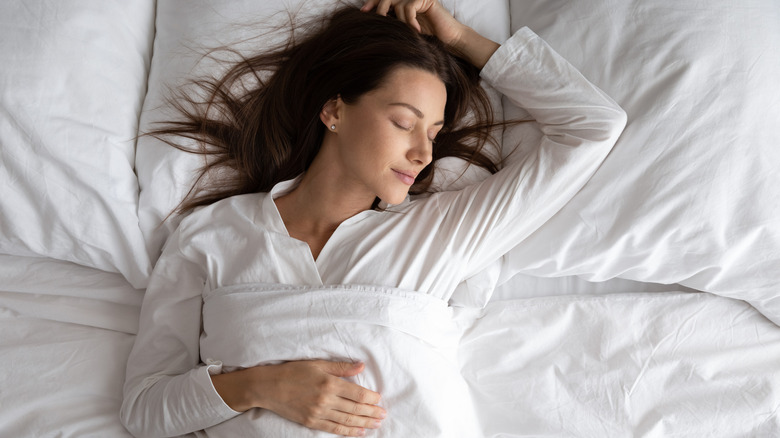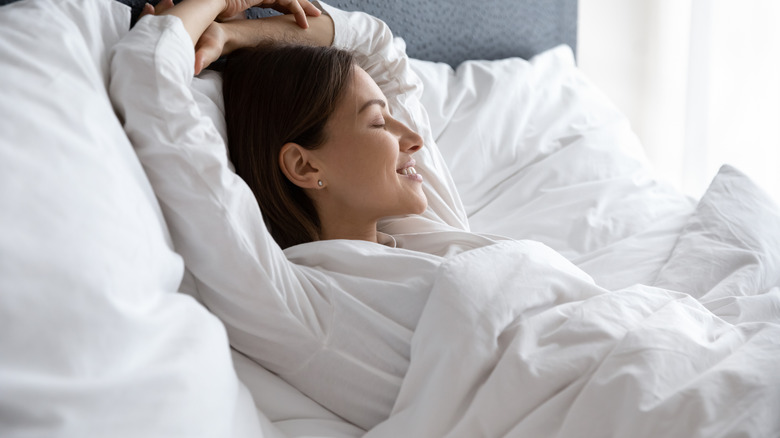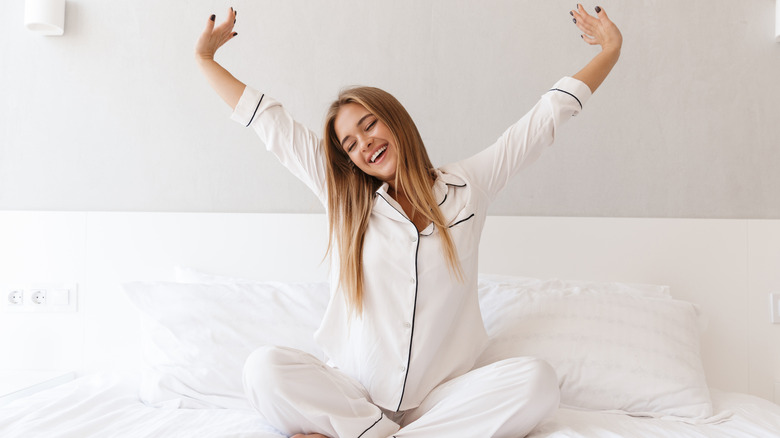
Fizkes/Shutterstock
By Sam Cohen/Sept. 2, 2021 7:48 pm EDT
Sleeping comfortably is difficult for many people regardless of what they do to relax before nodding off at night. This causes a variety of issues from permanent dark circles under the eye to fatigue, forgetfulness, and decreased critical thinking skills, per WebMD. If you’re one of these people, a simple suggestion may be the trick to solving all your sleepless woes. Studies suggest that sleeping on your back, often referred to as supine sleeping, is beneficial for several key reasons, each of which may help you address your personal sleep issues more effectively (via Healthline).
According to Healthline, sleeping on your back on a consistent basis helps align your spine, relieve buildup in your sinuses, reduce tension headaches and pressure on your chest, and it may even help prevent wrinkles. Each of these benefits are significant as sleep deprivation leads to a variety of complicated health problems, some of which may be more detrimental than others. Read on to learn more about why sleeping on your back could help solve your sleep issues once and for all.
Sleeping on your back reduces pain and breakouts

Numerous studies have been conducted to determine both the short-term and long-term benefits of sleeping on your back. One of the most significant findings was that back sleepers have noted a reduction in back and neck pain as this position limits the amount of tension on your spine (per Healthline). Remember to leave your hands by your sides or comfortably lain across your chest when you’re sleeping on your back for optimum pain reduction.
In addition to addressing your pesky neck and back discomfort, sleeping in the supine position improves your skin and reduces breakouts. This is because your pillowcase absorbs oils from your skin and hair which are easily transferred to your face while you’re sleeping on your stomach or side. When you sleep on your back, however, you limit this transference and reduce blackheads, whiteheads, and skin irritation in the process.
Healthline suggests using either a silk or satin pillowcase if you’re still concerned with the quality of your skin after switching to back sleeping.
Supine sleeping reduces tension headaches, heartburn, and acid reflux

If you wake frequently due to acid reflux or heartburn, sleeping on your back can help address this issue. According to Layla Sleep, “Sleeping on your back with your head and chest slightly elevated is the best position that could help eliminate nightly heartburn.” The same positioning works to alleviate acid reflux, but remember to lay with your stomach positioned lower than your esophagus to help your digestive tract operate properly.
Sleeping on your back is beneficial if you suffer from tension headaches as well, as the position helps reduce the amount of pressure on your head throughout the night (via Healthline). According to Medical News Today, “Poor neck alignment during sleep can cause headaches,” so be sure to keep your spine, neck, and head in a neutral position as this alleviates pressure most effectively. It isn’t a cure-all for tension headaches, but you may notice an improvement over time.
Sleeping on your back comfortably

Most people need to train themselves to sleep on their back. It’s an adjustment that takes place over time, but taking certain steps helps you ease into this new sleep position more comfortably.
Medical News Today suggests placing a small, round pillow under your neck with a flat pillow under your head. Memory foam pillows tend to work well for back sleeping, so it may be worth the investment if you haven’t tried one out yet. Place an additional pillow under your knees for added comfort before you attempt to sleep.
In some instances, back sleeping is not recommended. According to Layla Sleep, you should not sleep on your back if you’re beyond 20-weeks pregnant, if you’re a chronic snorer, or if you suffer from sleep apnea. Serious health issues may occur if you sleep on your back during any of these circumstances — it’s best to sleep on your stomach or side instead.
Source: Read Full Article
